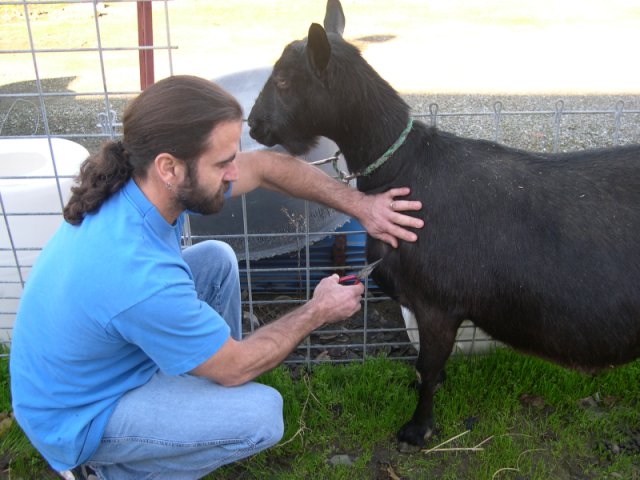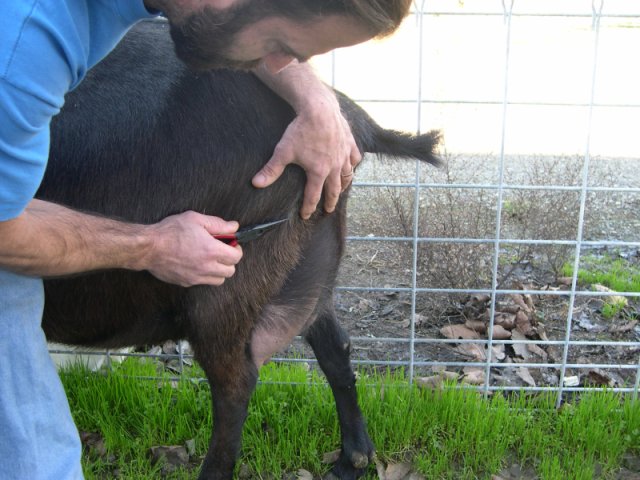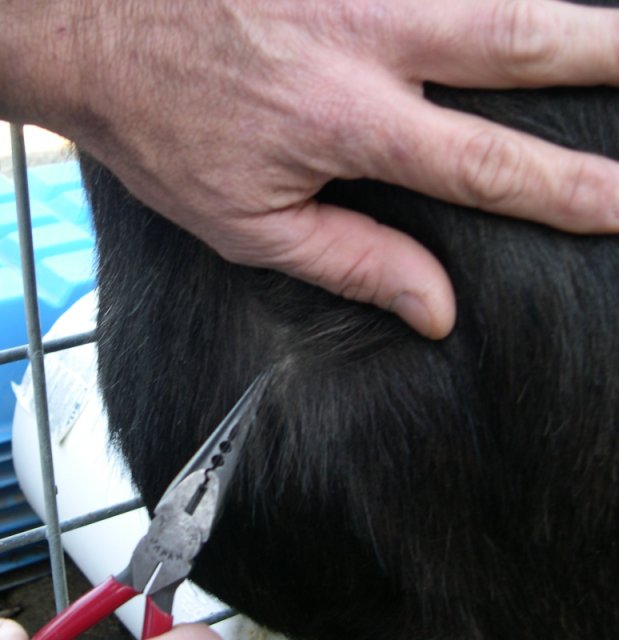Quick Summary
Click here for Price and Turnaround Time
Phenotype: Affected goats become stiff and immobile, and often fall over briefly, following sudden forceful movements or when startled.
Mode of Inheritance: Autosomal recessive
Alleles: N = Normal, CM = Myotonia Congenita
Breeds appropriate for testing: Myotonic or Tennessee Fainting Goat and their crosses, Nigerian Dwarf Goat
Explanation of results:
• Goats with N/N genotype will not have this inherited form of neuromuscular disorder and cannot transmit this allele to their offspring.
• Goats with N/CM genotype will not be affected by this inherited form of neuromuscular disorder but are carriers . They may transmit this allele to 50% of their offspring. Matings between two carriers are predicted to produce 25% of affected goats.
• Goats with CM/CM genotype are expected to develop this form of neuromuscular disorder and will transmit this allele to all of their offspring.
Sample Collection
Most goat DNA tests offered by the VGL are carried out using 20-40 hairs with roots.
Hair root from coarse, longer hair often found over withers, chest, rump, tail, back of hind leg, poll, or fetlock is the preferred sample type for goats.
Instructions
1. Clean (use comb if possible) by removing all loose hair and foreign matter.
2. Use fingers or pliers to grasp approximately 8-10 hairs close to the skin and pull. Pull (do NOT cut) hair strands. Examine the end of hair strands for presence of root bulbs. Hair roots are necessary for DNA testing. If the majority of hair strands lack the root bulbs, discard hair and start again.
3. Repeat until you have approximately 20-40 hairs with root follicles attached.
4. Place the 20-40 hairs with root follicles attached in the envelope and seal with the animal’s ID written on the envelope.
5. Repeat steps 1-4 for each additional animal being sampled.
Note:
- Hair should be dry.
- If hair has excess dirt and debris, please brush out if possible before pulling hairs for sample.
- Do not cut the hair! The roots contain the DNA for testing.
- When sampling several animals in the same session, make sure that there are no hair strands in your hands to reduce the possibility of sample contamination. Clean hands and/or pliers if possible.
Examples
Sampling goat chest hair:

Sampling goat rump hair:

Sampling technique using pliers:

Congenital myotonia (CM) is a heritable neuromuscular disorder characterized by a slow relaxation of skeletal muscles following voluntary contraction. The condition affects humans, goats (“fainting” goats) and horses.
Myotonic goats were originally from Tennessee and are also known as Nervous Goats, Wooden-Leg Goats, Scare Goats, Fainting Goats, and Tennessee Fainting Goats. A missense single nucleotide change in the CLCN1 gene (c.2656G>C) causes congenital myotonia in these goats, which characterizes the breed. Affected goats have well developed musculature and will become stiff when excited or startled, which may cause them to fall over briefly. The degree of stiffness can vary, with some goats rarely exhibiting stiffness and others showing frequent stiff responses. Some goats only become immobile while others fall over with every stiffness response.
This CM allele is inherited in an autosomal recessive manner, meaning that an animal must inherit two copies of the CM allele to be affected by this neuromuscular disorder. Goats with one copy of the CM allele are carriers and, while they will be normal, they may pass on the CM allele to their offspring.
This CM allele has been detected in Nigerian Dwarf Goats, although the frequency is yet unknown.
Testing recommendations: Testing for CM assists owners and breeders in identifying affected and carrier goats. Breeders can use results from the test as a tool for selection of mating pairs that fit their breeding preferences.
